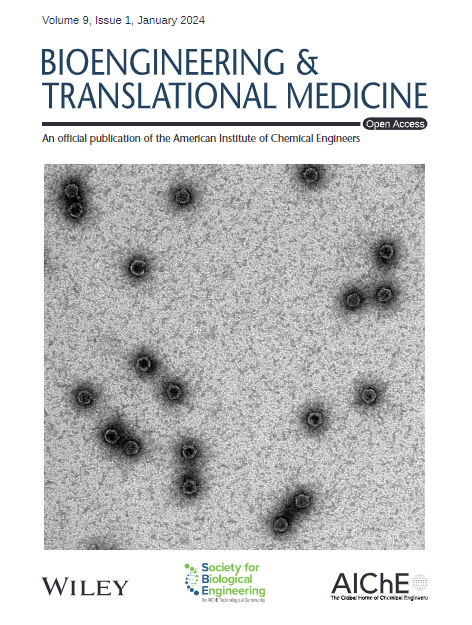工程益生菌通过分泌PCSK9纳米体和调节肠道微生物群来改善高脂血症和动脉粥样硬化
IF 5.7
2区 医学
Q1 ENGINEERING, BIOMEDICAL
引用次数: 0
摘要
低密度脂蛋白胆固醇(LDL - C)水平升高在心血管疾病(CVD)的发生和进展中起着关键作用。针对前蛋白转化酶枯草素/克辛9型(PCSK9)的抑制剂或单克隆抗体药物是一种新型降胆固醇药物,可以有效降低血清LDL - C水平。然而,这些药物通常很昂贵,需要注射,这可能会降低患者的依从性,增加经济负担。在这项研究中,我们构建了一种含有原核表达元件和人类PCSK9纳米体(PCSK9nb)高亲和力片段的工程益生菌菌株。在体外和体内评价了该工程菌表达和释放PCSK9nb的能力,以及其生物相容性和稳定性。利用小鼠高脂血症和动脉粥样硬化模型证实了工程益生菌的治疗潜力。我们使用高通量测序分析了小鼠肠道微生物群的差异,并比较了工程细菌与阿托伐他汀在小鼠高脂血症模型中的治疗效果。工程菌经口服后可在体内表达并释放PCSK9nb,达到降低血清胆固醇水平、缓解动脉粥样硬化、减轻体重的效果。在体内,PCSK9nb可提高肝脏LDL受体(LDLR)表达水平,降低血清LDL - C含量,调节肠道菌群多样性和群落结构,减少肝脏脂质积累,减轻全身炎症。通过与他汀类药物的疗效比较,工程益生菌显示出相似的治疗效果。该研究结果为开发口服PCSK9抗体药物,降低医疗成本和减少他汀类药物耐受性提供了新的策略。本文章由计算机程序翻译,如有差异,请以英文原文为准。
Engineered probiotic ameliorates hyperlipidemia and atherosclerosis by secreting PCSK9 nanobodies and regulating gut microbiota
Elevated levels of low‐density lipoprotein cholesterol (LDL‐C) play a critical role in the onset and progression of cardiovascular disease (CVD). Inhibitors or monoclonal antibody drugs targeting pro‐protein convertase subtilisin/kexin type 9 (PCSK9) are novel cholesterol‐lowering medications that can effectively reduce serum LDL‐C levels. However, these drugs are usually expensive and require injections, which can reduce patient compliance and increase the financial burden. In this study, we constructed an engineered probiotic strain containing a prokaryotic expression element and a high‐affinity fragment of the human PCSK9 nanobody (PCSK9nb). The engineered bacterium was evaluated in vitro and in vivo for its ability to express and release PCSK9nb, as well as for its biocompatibility and stability. The therapeutic potential of the engineered probiotics was confirmed using mouse models of hyperlipidemia and atherosclerosis. We analyzed differences in mouse gut microbiota using high‐throughput sequencing and compared the therapeutic efficacy of the engineered bacteria with that of atorvastatin in a mouse model of hyperlipidemia. The engineered bacteria were found to express and release PCSK9nb in vivo after oral administration, achieving the effect of lowering serum cholesterol levels, alleviating atherosclerosis, and reducing body weight. In vivo, PCSK9nb was found to increase hepatic LDL receptor (LDLR) expression levels, decrease serum LDL‐C content, regulate the diversity and community structure of gut microbiota, reduce lipid accumulation in the liver, and decrease systemic inflammation. By comparing their efficacy with that of statins, the engineered probiotics demonstrated similar therapeutic effects. The research results provide a new strategy for the development of orally delivered PCSK9 antibody drugs, reducing healthcare costs and minimizing statin drug tolerance.
求助全文
通过发布文献求助,成功后即可免费获取论文全文。
去求助
来源期刊

Bioengineering & Translational Medicine
Pharmacology, Toxicology and Pharmaceutics-Pharmaceutical Science
CiteScore
8.40
自引率
4.10%
发文量
150
审稿时长
12 weeks
期刊介绍:
Bioengineering & Translational Medicine, an official, peer-reviewed online open-access journal of the American Institute of Chemical Engineers (AIChE) and the Society for Biological Engineering (SBE), focuses on how chemical and biological engineering approaches drive innovative technologies and solutions that impact clinical practice and commercial healthcare products.
 求助内容:
求助内容: 应助结果提醒方式:
应助结果提醒方式:


